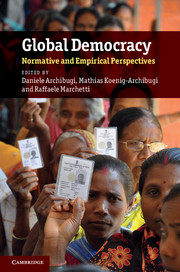Book contents
- Frontmatter
- Contents
- Figures
- Tables
- Notes on contributors
- Acknowledgements
- 1 Introduction
- 2 Models of global democracy
- 3 Citizens or stakeholders?
- 4 Is democratic legitimacy possible for international institutions?
- 5 Cosmopolitan democracy
- 6 Regional versus global democracy
- 7 Towards the metamorphosis of the United Nations
- 8 Flexible government for a globalized world
- 9 Global democracy and domestic analogies
- 10 Global democracy for a partially joined-up world
- 11 Civil society and global democracy
- 12 Global capitalism and global democracy
- 13 From peace between democracies to global democracy
- 14 The promise and perils of global democracy
- Index
- References
6 - Regional versus global democracy
Advantages and limitations
Published online by Cambridge University Press: 05 June 2012
- Frontmatter
- Contents
- Figures
- Tables
- Notes on contributors
- Acknowledgements
- 1 Introduction
- 2 Models of global democracy
- 3 Citizens or stakeholders?
- 4 Is democratic legitimacy possible for international institutions?
- 5 Cosmopolitan democracy
- 6 Regional versus global democracy
- 7 Towards the metamorphosis of the United Nations
- 8 Flexible government for a globalized world
- 9 Global democracy and domestic analogies
- 10 Global democracy for a partially joined-up world
- 11 Civil society and global democracy
- 12 Global capitalism and global democracy
- 13 From peace between democracies to global democracy
- 14 The promise and perils of global democracy
- Index
- References
Summary
Introduction
Regionalism has come to the fore in recent economic and political developments and has been an important subject of attention in contemporary political science. Especially in view of the rise to prominence of the European Union (EU) over the past decades (despite the various setbacks), theorists have taken notice of the new forms of regional coordination and cooperation not only there but in other parts of the world (e.g., Latin America, southeast Asia etc.), where these particularly concern economic matters, though in some cases political organization as well. However, there has been considerably less attention to the normative implications of these developments, though some theorists (especially of international law) have pointed to the regional human rights agreements that are beginning to be taken seriously, while other theorists (especially of international relations) have commented on the democratic deficit in the EU. Further, while theorists of democracy and human rights have analysed the justifications and roles that these norms may play in national contexts and increasingly even in global contexts, scant attention has been given to their potential for guiding and constraining regional economic and political development. Instead, several cosmopolitan democratic theorists, as also cosmopolitan theorists of justice, seem to want to move the discussion directly from the level of the nation-state to that of the world as a whole, with little analysis of the emerging regionalism, increasingly recognized as important in practical affairs and in political science generally.
Where more cosmopolitan forms of democracy have been discussed, what many thinkers have in mind is either full global democracy or else simply more democratic accountability in the institutions of global governance, again without attention to the normative requirements for democracy in the new regional associations. And where regionalism is considered in its implications for democracy, the discussions have tended to concern only the case of the EU, with considerations directed to strengthening its parliament, implementing European political parties etc. Equally striking and important, perhaps, where regionalism is projected elsewhere and evaluated for its potential contributions for new forms of cooperation, it tends to be thought of exclusively in terms of the model provided by the EU. Yet, one of the main advantages of regionalization would seem to be the retention or enabling of a certain level of cultural diversity around the world, rather than supposing that all regions should simply follow the model of the EU.
- Type
- Chapter
- Information
- Global DemocracyNormative and Empirical Perspectives, pp. 115 - 131Publisher: Cambridge University PressPrint publication year: 2011

